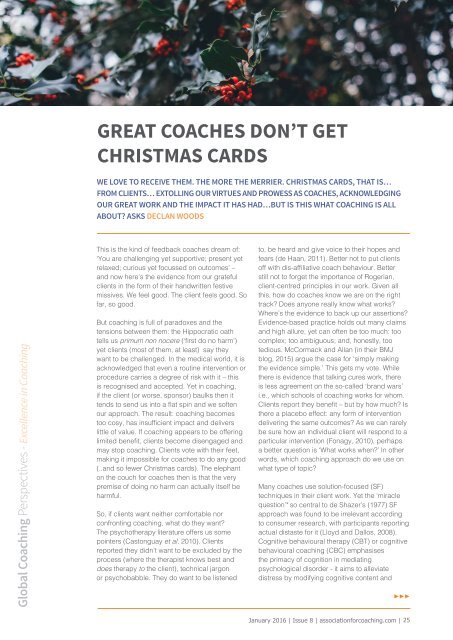Global Coaching Perspectives
bcth8
bcth8
Create successful ePaper yourself
Turn your PDF publications into a flip-book with our unique Google optimized e-Paper software.
Great coaches don’t get<br />
Christmas cards<br />
We love to receive them. The more the merrier. Christmas cards, that is…<br />
from clients… extolling our virtues and prowess as coaches, acknowledging<br />
our great work and the impact it has had…but is this what coaching is all<br />
about? asks Declan Woods<br />
<strong>Global</strong> <strong>Coaching</strong> <strong>Perspectives</strong> - Excellence in <strong>Coaching</strong><br />
This is the kind of feedback coaches dream of:<br />
‘You are challenging yet supportive; present yet<br />
relaxed; curious yet focussed on outcomes’ –<br />
and now here’s the evidence from our grateful<br />
clients in the form of their handwritten festive<br />
missives. We feel good. The client feels good. So<br />
far, so good.<br />
But coaching is full of paradoxes and the<br />
tensions between them: the Hippocratic oath<br />
tells us primum non nocere (‘first do no harm’)<br />
yet clients (most of them, at least) say they<br />
want to be challenged. In the medical world, it is<br />
acknowledged that even a routine intervention or<br />
procedure carries a degree of risk with it – this<br />
is recognised and accepted. Yet in coaching,<br />
if the client (or worse, sponsor) baulks then it<br />
tends to send us into a flat spin and we soften<br />
our approach. The result: coaching becomes<br />
too cosy, has insufficient impact and delivers<br />
little of value. If coaching appears to be offering<br />
limited benefit, clients become disengaged and<br />
may stop coaching. Clients vote with their feet,<br />
making it impossible for coaches to do any good<br />
(..and so fewer Christmas cards). The elephant<br />
on the couch for coaches then is that the very<br />
premise of doing no harm can actually itself be<br />
harmful.<br />
So, if clients want neither comfortable nor<br />
confronting coaching, what do they want?<br />
The psychotherapy literature offers us some<br />
pointers (Castonguay et al, 2010). Clients<br />
reported they didn’t want to be excluded by the<br />
process (where the therapist knows best and<br />
does therapy to the client), technical jargon<br />
or psychobabble. They do want to be listened<br />
to, be heard and give voice to their hopes and<br />
fears (de Haan, 2011). Better not to put clients<br />
off with dis-affiliative coach behaviour. Better<br />
still not to forget the importance of Rogerian,<br />
client-centred principles in our work. Given all<br />
this, how do coaches know we are on the right<br />
track? Does anyone really know what works?<br />
Where’s the evidence to back up our assertions?<br />
Evidence-based practice holds out many claims<br />
and high allure, yet can often be too much: too<br />
complex; too ambiguous; and, honestly, too<br />
tedious. McCormack and Allan (in their BMJ<br />
blog, 2015) argue the case for ‘simply making<br />
the evidence simple.’ This gets my vote. While<br />
there is evidence that talking cures work, there<br />
is less agreement on the so-called ‘brand wars’<br />
i.e., which schools of coaching works for whom.<br />
Clients report they benefit – but by how much? Is<br />
there a placebo effect: any form of intervention<br />
delivering the same outcomes? As we can rarely<br />
be sure how an individual client will respond to a<br />
particular intervention (Fonagy, 2010), perhaps<br />
a better question is ‘What works when?’ In other<br />
words, which coaching approach do we use on<br />
what type of topic?<br />
Many coaches use solution-focused (SF)<br />
techniques in their client work. Yet the ‘miracle<br />
question’* so central to de Shazer’s (1977) SF<br />
approach was found to be irrelevant according<br />
to consumer research, with participants reporting<br />
actual distaste for it (Lloyd and Dallos, 2008).<br />
Cognitive behavioural therapy (CBT) or cognitive<br />
behavioural coaching (CBC) emphasises<br />
the primacy of cognition in mediating<br />
psychological disorder - it aims to alleviate<br />
distress by modifying cognitive content and<br />
January 2016 | Issue 8 | associationforcoaching.com | 25


